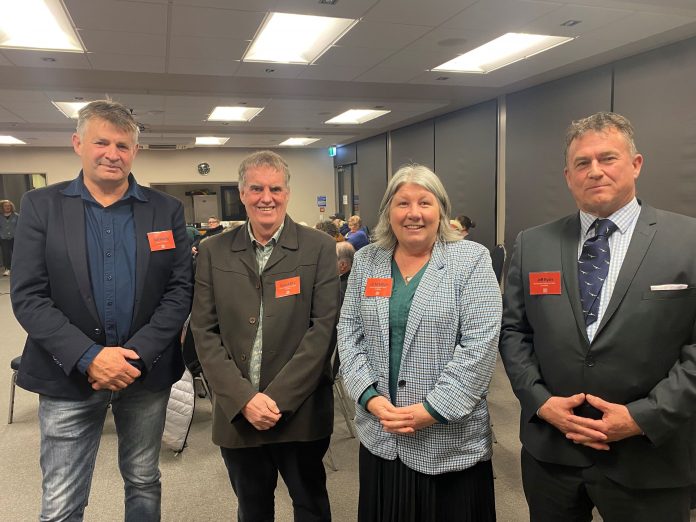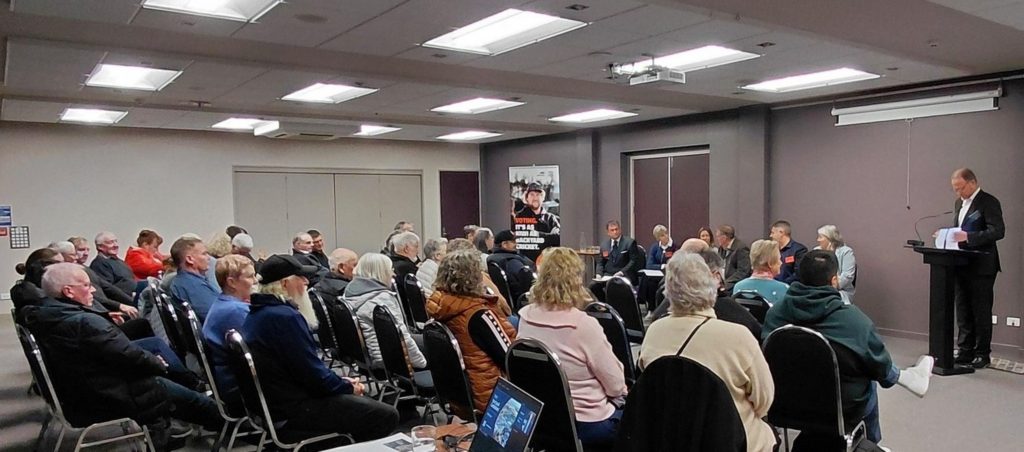
Rate rises, housing issues, and a focus on the frilly bits.
Ashburton District candidates were put under examination in front of around 60 people at a meet-the-candidates event in Methven on Wednesday night.
It was for Mayoral and Western Ward hopefuls.
It was the first public outing for mayoral wannabes – Liz McMillan, Russell Ellis, Rob Mackle and Jeff Ryan – to plead their case, with McMillan also standing in the Western Ward with Deb Gilkison and Jeanette Maxwell.
Another meeting is set for Wednesday night, 7pm, at Ashburton College auditorium for the mayoral candidates, and those standing for the five-seat Ashburton Ward. They include Ellis and Ryan, as well as Carolyn Cameron, Leonard Cojocaru, Phill Hooper, Julie Moffett, Steph Poole, Tony Todd, and Dolf van Amersfoort.
In Methven, the candidates were grilled with a series of questions, with 60 seconds to respond, and there were not many surprises in the responses until the final statement of the evening.
Ryan was the final candidate to offer a closing remark and chose to announce that “my deputy, if I’m successful, will be Liz”.
The announcement caught his rival mayoral candidate by surprise and was met with muted laughter by the big crowd that had turned up.
How to address Airbnb and housing demand issues, specifically in Methven, was put to the candidates.
Ryan said nothing needed to be done, and he doesn’t think Airbnb owners should face stricter rules as “people are entitled to do what they want to do and have their own business”.
“We need more accommodation, and we have got a lot of rich farmers, dig in your pockets and start building some houses.”
Later in the meeting, Ryan contradicted his “people have a right to do what they want to do” sentiments, stating he “doesn’t agree with farmers buying houses in town”.
“If I were going to bring a tax, I’d tax farmers who buy houses in town for investments.”
The other candidates said it needs a better balance between providing accommodation to support tourism and to house the people who live and work to support the tourism, and other, industries.
Ellis said the council has already started looking into it, and he thinks “somewhere there has to be a happy medium that works for everyone”.
Mackle felt there would be restrictions coming for Airbnb but said it’s probably not up to the council to deal with the accommodation issue, “it’s probably the ski fields’ problem… that’s their staff”.
Airbnb are necessary Gilkison said, but “the problem is that it’s not a level playing field”.
McMillan and Maxwell agreed it needed balance, and working out how to achieve that could include a targeted rate like other councils.

The candidates were asked how they would approach reducing rate increases.
Ellis said the only way to reduce rates is to reduce the levels of service somewhere.
“It’s a trade-off. We either do the things we are doing and do them well or reduce the level of service.”
Mackle said to “stop spending money on unnecessary stuff around, just focus on the core stuff for a while”.
He didn’t offer up examples of the “frilly bits that need to disappear”.
McMillan said it’s a matter of sticking to the core functions and making responsible decisions around the budgets.
Ryan’s solution is to create more income, wanting to extract gravel from the rivers, for flood protection, and sell it.
He did not reference a previous pledge in March to “reduce rates by 20 per cent and provide a rebate for the last three years of overpricing”.
Maxwell said reducing rates will result in borrowing and “boy, will you be paying later”.
She said it’s about being fiscally responsible and “just leave the frilly stuff”.
Gilkison said everyone is feeling the pinch and the council needs to “take it really seriously” with what they do with ratepayers’ money.
Questions about rate rises led to a question around what candidates considered to be the core roles and nice to haves – the “frilly bits”.
Gilkison “didn’t realise there would be a whole section on frilly bits, but here we are”.
She wants a district people can be proud of while “not being silly with the frilly”.
“Everything does come down to dollars and sense, but I don’t think we want to give up having an amazing place to live.”
McMillan said the Government is telling councils what the core roles are, putting things like community grants or a new Ashburton welcome sign in the realm of not being a core service.
Ellis pointed to the extension of EA Networks Centre sitting in the long-term plan as something some see as a must-have and others a nice-to-have.
The “frilly bits are around the edges” of the budget and would be a reduction in the level of service.
Mackle said the want-to-haves must disappear, stating he feels the EA Networks extension is a want-to-have.
“It can service its need at the moment, and a lot of money can be saved, like millions, by not even doing that job”.
Ryan said there is far too much being spent on compliance and consultancy so there is savings we can find.“
“Can we lower our debt with some of the assets we’ve got.
“Whether we sell them to reduce our debt down and take a bit of the pressure off.”
For Maxwell, the frills are things that can wait – “the lovelies, the nice to haves, but the not right nows”.




